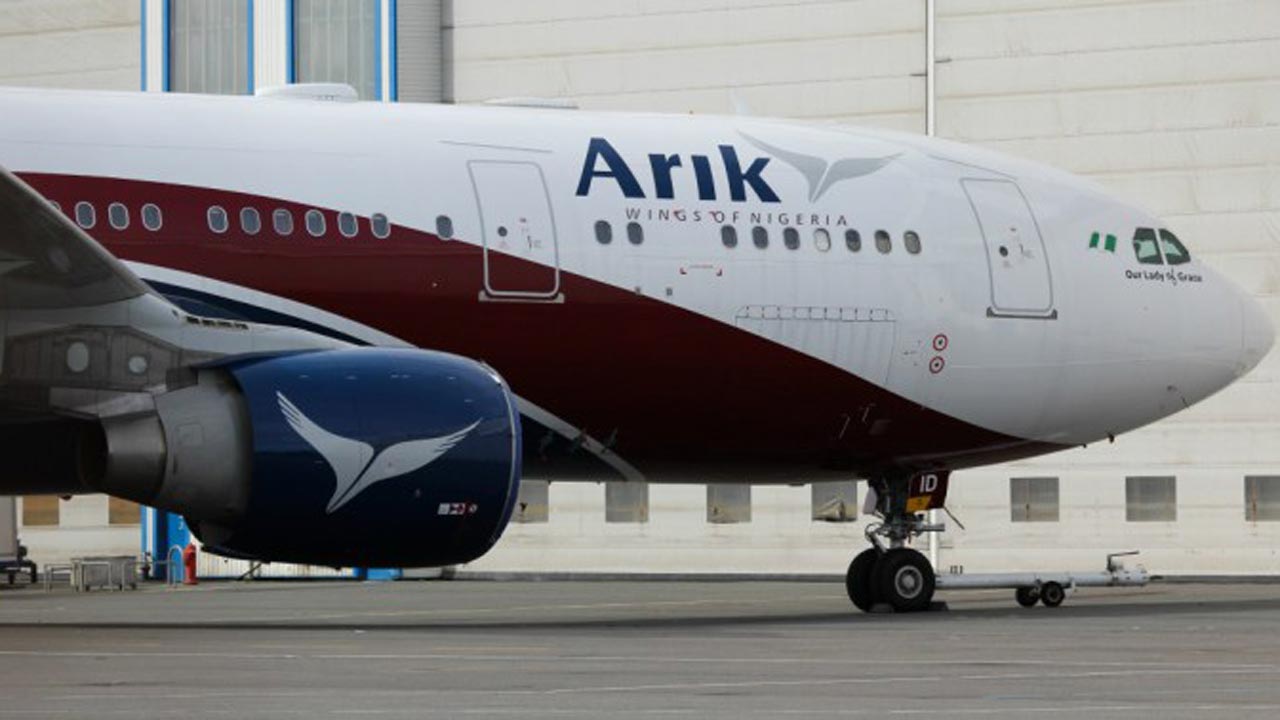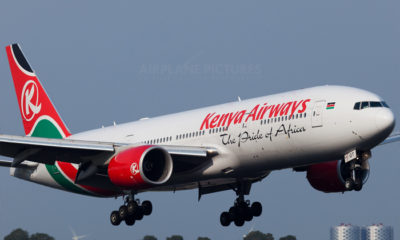Business
AMCON Scales Down Arik’s Operations
Published
8 years agoon

- AMCON Scales Down Arik’s Operations
Following its take over of Arik Air over two weeks ago, the Asset Management Corporation of Nigeria (AMCON) has scaled down the flight operations of Nigeria’s premier carrier to less than 30 per cent of the its capacity.
However, AMCON, in a statement yesterday, said public confidence in the airline was gradually returning and commercial banks more willing to engage with Arik Air.
But AMCON’s statement contradicts reality. When a reporter visited the General Aviation Terminal (GAT) of the Murtala Muhammed International Airport (MMIA), Lagos yesterday at 11.30 a.m., all the check-in counters of the once rowdy terminal were empty and totally bereft of passengers.
Instead, Arik ground staff were seen at their desks, waiting to attend to anyone willing to travel with the airline.
The airline, which at peak periods operated 120 flights a day, now operates about 15 flights daily with very low load factors, as passengers continue to shun the airline since the intervention by AMCON.
Also, it was learnt that of 28 operating aircraft in the airline’s fleet, only eight are now in operation comprising the two Bombardier CRJ 900s, one Bombardier Q400, and five Boeing 737s.
The Q400 is in a dedicated service with Chevron, effectively leaving the airline with seven operating aircraft for commercial flights.
This has forced Arik to cut back its domestic and regional operations, just as the airline suspended its international service immediately AMCON changed its management.
It was also gathered that international financiers and other creditors of the airline have concluded plans to sue the federal government after 30 days of AMCON’s intervention in the airline.
A source with the airline said that the creditors are consulting their lawyers to collectively file a class action suit against the government for the airline’s failure to honour its international obligations.
Inside sources further maintained that Arik’s workers who were owed two months salaries – December and January – before AMCON took over the management of the company on February 8, were only paid their January salaries.
AMCON, however, has maintained that the airline had a backlog of unpaid salaries of seven months when it took over two weeks ago.
According to some of the workers, who spoke on condition of anonymity, AMCON informed them that the December salaries should have been paid by the former management before it took over the company, which the corporation is currently auditing.
Also, cabin crew personnel whose November flight allowances were supposed to have been paid with the December basic salary, said they had lost hope that the money would ever be paid, now that AMCON is insisting that the former management should pay the December salaries.
“We were actually owed two months salaries before AMCON took over. I know that the Nigerian Civil Aviation Authority (NCAA) insisted that Arik must pay all of us our outstanding salaries in December, which the airline did after the labour strike. So it was the December and January salaries that were owed us,” an official of the airline said.
Many of the workers said even before AMCON took over, passenger traffic was already dropping because of cancelled and delayed flights. The situation only got worse with AMCON’s intervention, they added.
“AMCON has not been able to restore passenger confidence and because we have scaled down our flights, passengers now choose other airlines.
“Yesterday (Saturday), we operated to Benin from Lagos with only 18 passengers going and on the return leg. It is only the Port Harcourt service that still has a reasonable number of passengers,” one Arik official volunteered.
Also, since the take over of the airline and the cancellation of most of its regional flights, Nigeria has lost its dominance on the West coast and other African routes to Asky, AWA and the Cote d’Ivorian national carrier.
Arik was the only Nigerian airline that operated to Dakar, Abidjan, Luanda and Libreville.
Since the intervention by AMCON, it has stopped operating to most of these destinations.
The airline used to operate six flights to Accra from Abuja and Lagos, but the flights have been scaled down to two since AMCON stepped in.
According to sources in Arik, it is now uncertain if the airline will continue to operate on any of these destinations in the West coast.
“What AMCON has done is that it has cut back flights because of inadequate supply of fuel and equipment, but all the flights that it still operates are on time.
“So it has restored on time flight services, but only 30 per cent of the flights or less are still operating.
“Before their take over, Arik flights were characterised by delays and cancellations. It is really tough for AMCON to effectively manage the airline.
“We know that it will be difficult to generate the kind of revenue needed to pay overheads, salaries and still have operational funds with the scaled down services,” the Arik official said.
However, AMCON said yesterday that public confidence was gradually returning to Arik Air, two weeks after it took over the airline.
AMCON made the claim in a statement signed by its spokesperson, Jude Nwauzor, reported the News Agency of Nigeria (NAN).
Nwauzor said the new management, when the airline was taken over, was confronted with a barrage of challenges but has surmounted the problems, adding that the new team has been stabilising the airline’s operations with the few aircraft left in the fleet.
AMCON said, unlike what obtained before the take over, average On-Time-Performance (OTP) of Arik Air to different destinations had improved.
The corporation also claimed that Nigerian banks, which had turned their backs on Arik, were now cooperative and ready to support the new management.
According to the spokesperson, engagements with international and local creditors had also been successful, while discussions with critical service providers and industry stakeholders had yielded the much desired results.
“Arik has also paid the insurance premium, which was on the verge of expiring and commenced the payment of outstanding salaries, which is a great morale booster for staff.
“Arik is also in discussions with different creditors and stakeholders to recall a good number of its aircraft as soon as possible, which will increase the number of daily flights,” he said.
The corporation said a good number of passengers affected by the suspension of flights to some routes had been refunded, adding that efforts were in the works to reach out to those yet to get their refunds.
Nwauzor noted that with the positive turn of events in the airline since its take over, customers of Arik, especially from corporate circles, were gradually returning.
AMCON added that efforts aimed at improving performance within a short period had translated to a stable and professional management for the airline.
In this respect, AMCON quoted the new management as saying that efforts at reviving the airline were boosted by the fact that Arik has an unparalleled safety record that “speaks for itself in the history of aviation in the country”.
AMCON said it had also held a series of fruitful engagements and struck agreements with major suppliers of aviation fuel for regular supply to Arik to guarantee regular flights.
Is the CEO and Founder of Investors King Limited. He is a seasoned foreign exchange research analyst and a published author on Yahoo Finance, Business Insider, Nasdaq, Entrepreneur.com, Investorplace, and other prominent platforms. With over two decades of experience in global financial markets, Olukoya is well-recognized in the industry.

You may like
-


Trump’s 14% Tariff on Nigerian Imports Raises Fresh Concerns for Trade and Economic Stability
-


Nigeria Secures $1.08 Billion World Bank Support to Boost Education and Combat Malnutrition
-


Trump Declares Economic Emergency Introduces Tariffs on Nigerian Exports
-


Nigeria, Brazil Partner on $1.1bn Agricultural Revolution Plan
-


Nigeria Considers Creation of 31 New States Despite Economic Challenges
-


Visa Denial Sparks Airport Drama as Kenya Airways Defends Staff



